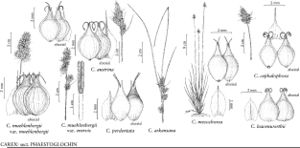Difference between revisions of "Carex mesochorea"
Bull. Torrey Bot. Club 37: 246. 1910.
FNA>Volume Importer |
imported>Volume Importer |
||
| Line 8: | Line 8: | ||
}} | }} | ||
|common_names=Carex de l’arrière-pays | |common_names=Carex de l’arrière-pays | ||
| + | |special_status={{Treatment/ID/Special_status | ||
| + | |code=F | ||
| + | |label=Illustrated | ||
| + | }}{{Treatment/ID/Special_status | ||
| + | |code=E | ||
| + | |label=Endemic | ||
| + | }} | ||
|basionyms={{Treatment/ID/Basionym | |basionyms={{Treatment/ID/Basionym | ||
|name=Carex mediterranea | |name=Carex mediterranea | ||
| Line 56: | Line 63: | ||
|publication title=Bull. Torrey Bot. Club | |publication title=Bull. Torrey Bot. Club | ||
|publication year=1910 | |publication year=1910 | ||
| − | |special status= | + | |special status=Illustrated;Endemic |
| − | |source xml=https:// | + | |source xml=https://bibilujan@bitbucket.org/aafc-mbb/fna-data-curation.git/src/bb6b7e3a7de7d3b7888a1ad48c7fd8f5c722d8d6/coarse_grained_fna_xml/V23/V23_509.xml |
|genus=Carex | |genus=Carex | ||
|section=Carex sect. Phaestoglochin | |section=Carex sect. Phaestoglochin | ||
Revision as of 22:35, 27 May 2020
Plants without conspicuous rhizomes. Culms 15–100 cm, 1.5–3 mm wide basally, 0.9–1.1 mm wide distally. Leaves: sheaths tight, green, fronts hyaline, yellow-brown and thickened at mouth; ligules to 3 mm, wider than long; blades 2.5–4 mm at widest. Inflorescences forming dense heads, with 4–8 spikes, 1–1.5 times as long as wide, 1–2 cm × 9–14 mm; proximal bracts not more than 2 cm; spikes with 8–20 ascending to spreading perigynia. Pistillate scales brownish to green-hyaline with green, 3-veined center, ovate, 2.3–3.1 × 1.2–2 mm, narrower than and as long as perigynia, apex cuspidate to short-awned. Anthers 1.1–1.7 mm. Perigynia pale green to pale brown, weakly veined or veinless abaxially, 3–4.1 × (1.7–)2–2.6 mm, margins serrulate distally; beak 0.8–1 mm, apical teeth 0.2–0.3 mm. Achenes suborbiculate, 1.5–1.7 × 1.3–1.5 mm.
Phenology: Fruiting late spring–early summer.
Habitat: Dry grasslands, roadsides, railroads
Elevation: 100–300 m
Distribution

Ont., Ala., Calif., Conn., D.C., Ga., Ill., Ind., Kans., Ky., Md., Mass., Mich., Mo., Nebr., N.J., N.Y., N.C., Ohio, Pa., S.C., Tenn., Tex., Va., W.Va.
Discussion
Carex mesochorea is naturalized in California and is probably not native at the northern and eastern limits of its range.
Selected References
None.
